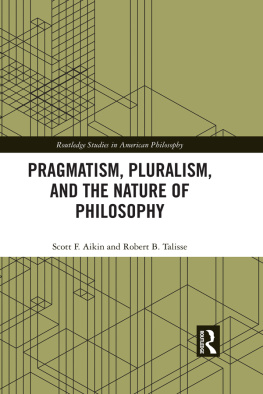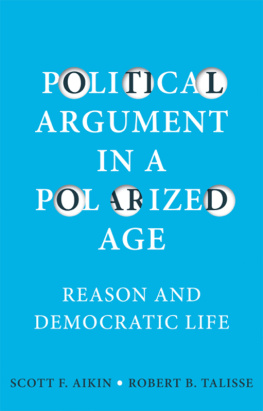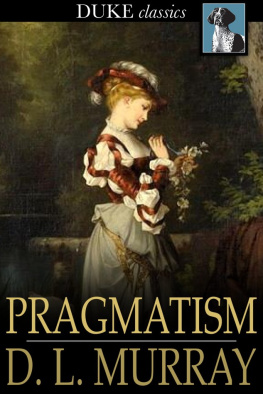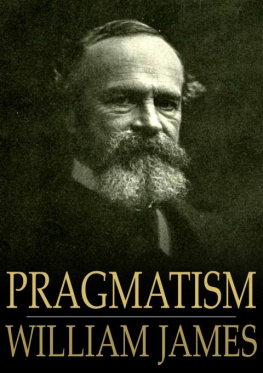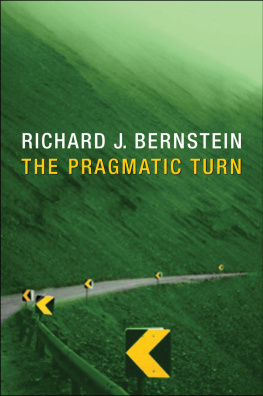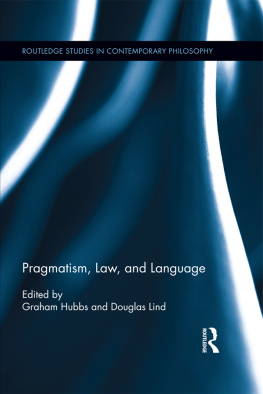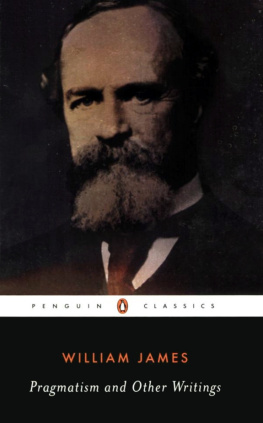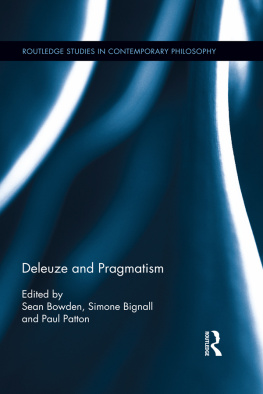The right of Scott F. Aikin and Robert B. Talisse to be identified as authors of this work has been asserted by them in accordance with sections 77 and 78 of the Copyright, Designs and Patents Act 1988.
All rights reserved. No part of this book may be reprinted or reproduced or utilised in any form or by any electronic, mechanical, or other means, now known or hereafter invented, including photocopying and recording, or in any information storage or retrieval system, without permission in writing from the publishers.
Names: Aikin, Scott F., author. | Talisse, Robert B., author.
F. Aikin and Robert B. Talisse.
Description: 1 [edition]. | New York : Routledge, 2017. | Series:
bibliographical references and index.
alk. paper)
Subjects: LCSH: Pragmatism. | Philosophy, American.
Citations of John Deweys writing are keyed to the thirty-seven volume Collected Works of John Dewey (Carbondale: Southern Illinois University Press, 19691991). The Collected Works is divided into three periods: Early Works , Middle Works , and Later Works , which are abbreviated respectively as EW, MW, and LW. Parenthetical citations follow the standard format: (volume period and number: page number).
Unless otherwise indicated, citations to William Jamess writing are keyed to The Writings of William James , edited by John J. McDermott (Chicago: University of Chicago Press, 1977). Parenthetical citations follow the format: (WWJ: page number).
Citations of Charles Peirces writing are keyed to the eight-volume Collected Papers of Charles Sanders Peirce (Cambridge: Harvard University Press, 193158). Parenthetical citations follow the standard format: (CP volume number: paragraph number).
Citations of W.K. Cliffords writings are keyed to the collection Lectures and Essays , edited by Leslie Stevenson and Sir Frederick Pollock (London: MacMillan and Co., 1901). Parenthetical citations will follow the format: (L&E: page number).
Routledge Studies in American Philosophy
Edited by:
Willem deVries,
University of New Hampshire, USA
Henry Jackman,
York University, Canada
For a full list of titles in this series, please visit www.routledge.com
3 Pragmatic Encounters
Richard J. Bernstein
4 Toward a Metaphysics of Culture
Joseph Margolis
5 Gewirthian Perspectives on Human Rights
Edited by Per Bauhn
6 Toward a Pragmatist Metaethics
Diana B. Heney
7 Sellars and Contemporary Philosophy
Edited by David Pereplyotchik and Deborah R. Barnbaum
8 Pragmatism and Objectivity
Essays Sparked by the Work of Nicolas Rescher Edited by Sami Pihlstrm
9 The Quantum of Explanation
Whiteheads Radical Empiricism
Randall E. Auxier and Gary L. Herstein
10 Peirce on Perception and Reasoning
From Icons to Logic
Edited by Kathleen A. Hull and Richard Kenneth Atkins
11 Pierces Speculative Grammar
Logic as Semiotics
Francesco Bellucci
12 Pragmatism, Pluralism, and the Nature of Philosophy
Scott F. Aikin and Robert B. Talisse
Contents
by Cheryl Misak
Guide
This volume represents a decade and a half of collaborative philosophizing. Although no chapter of the present volume is a simple reproduction of something already in print, much of the material contained within has its origin in previously published work. Our model of collaboration follows a typical path; our articles begin as conversations that get written into conference-length papers. The papers are then presented at a few conferences, reworked, and expanded into journal-length pieces, and then submitted. Accordingly, we have incurred a large number of intellectual debts over the course of producing the jointly authored work that provided the raw material from which is volume has emerged. We thus would like to thank the following people. Of course, we couldnt possibly explicitly mention every person who has helped us along the way, so we apologize in advance for any glaring omissions.
First, we thank all of our colleagues and students at Vanderbilt University for their criticisms, questions, comments, and not least of all, forbearance, over the many years we spent trying to figure out exactly what we wanted to say about pragmatism and the other topics discussed herein. Among the extended Vanderbilt crew, the following have been especially helpful to us: Jason Aleksander, James Bednar, W. James Booth, Mary Butterfield, Caleb Clanton, Allen Coates, Josh Crites, Tommy Crocker, Thomas Dabay, Rebecca Davenport, Elizabeth Edenberg, Jeff Edmonds, Andrew Forcehimes, John Goldberg, Lenn Goodman, Tempest Henning, Micah Hester, Michael Hodges, John Lachs, Sebastian Lurie, Katherine Loevy, Chris King, Emily McGill, Amy McKiernan, Lisa Madura, Mason Marshall, Jos Medina, John Post, Brian Ribeiro, Luke Semrau, Aaron Simmons, Glenn Trujillo, Jeffrey Tlumak, John Weymark, and Julian Wuerth.
Audiences at conferences where early versions of this material were presented were of course crucial in enabling us to make our ideas clear. Often, those pressing the toughest criticisms were also those most willing to provide assistance in helping us to improve our views long after the conference ended. We thank those who have asked us questions at conferences, commented on our work, or even just engaged us in conversation about our views. The following stand out in memory as especially helpful: Richard Atkins, Guy Axtell, Jody Azzouni, Michael Bacon, Heather Battaly, David Beisecker, Thom Brooks, Otvio Bueno, Tom Burke, Steve Cahn, Gregg Caruso, John Casey, Elizabeth Cooke, Shannon Dea, Ian Dove, Maureen Eckert, Matthew Festenstein, Joshua Forstenzer, Richard Gale, Jerry Gaus, Gabriele Gava, Sandy Goldberg, Dwight Goodyear, David Miguel Gray, Peter Hare, Diana Heney, David Hildebrand, Charlie Hobbs, Brendan Hogan, Christopher Hookway, Andrew Howat, Henry Jackman, Nate Jackson, Ralph Johnson, Angelo Juffras, Klemens Kappel, David Kaspar, Frederic Kellogg, Ian James Kidd, Philip Kitcher, Alexander Klein, Helene Landemore, Cathy Legg, Anabelle Lever, Steven Levine, Michael Lynch, David Macarthur, Joseph Margolis, Lee McBride, Cheryl Misak, Jonathan Neufeld, James OShea, Jon Olafsson, Peter Olen, Fabienne Peter, John Peterman, Sami Philstrm, Huw Price, Bjorn Ramburg, David Rondel, Dan Rosenberg, Henryk Rydenfeldt, Carl Sachs, Andrew Smith, Ronald de Sousa, William Stephens, Bob Stern, Rob Tempio, Lawrence Torcello, David Wiggins, and Brian Zamulinski.

